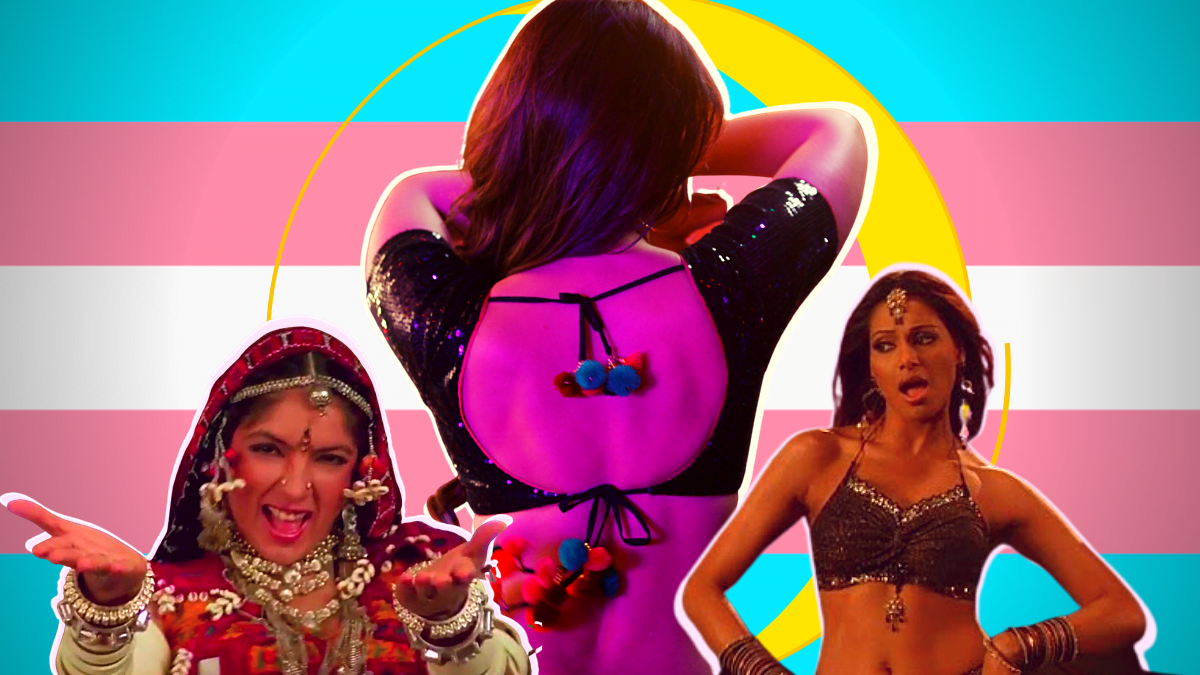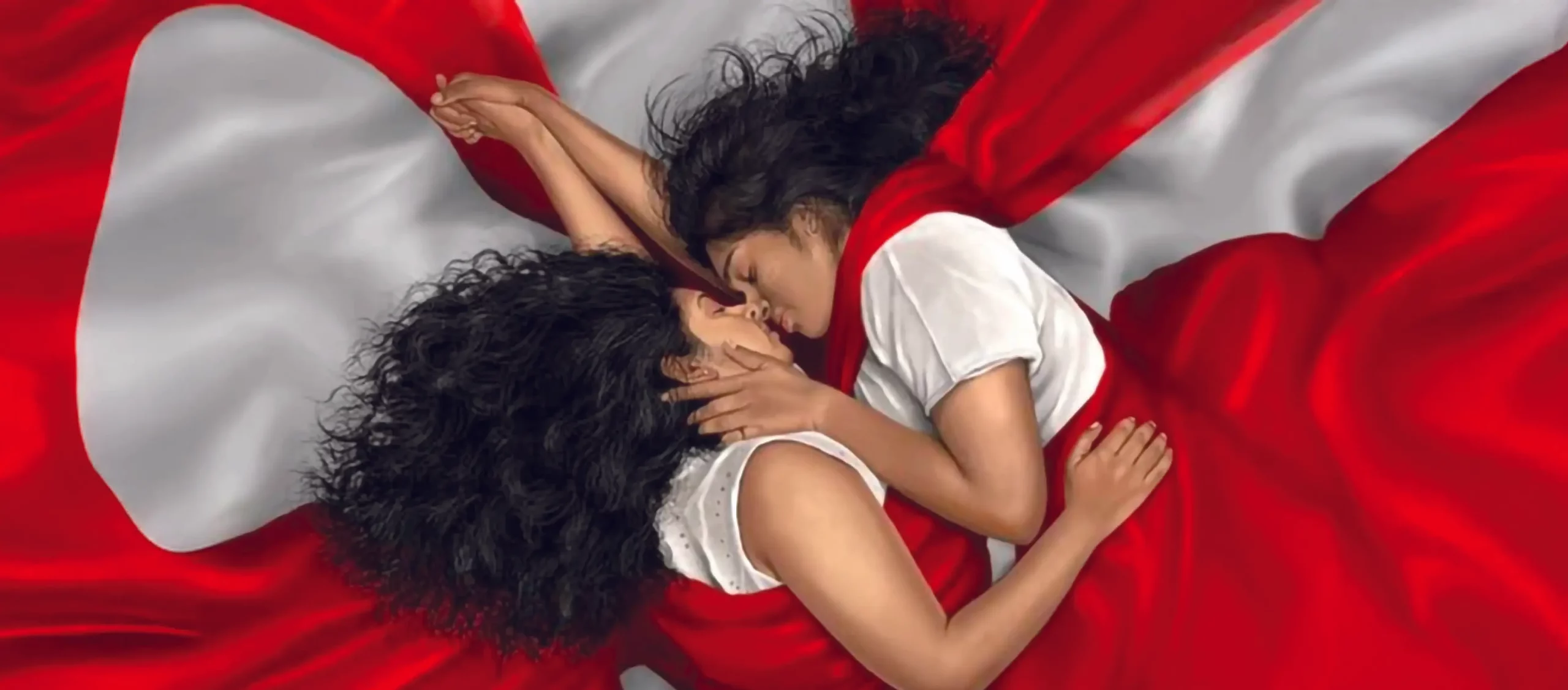I have wandered in the dark streets of Kolkata, through the stench of smoke and alcohol at late hours to hunt for men who would hunt for me. Clad in clothes, shimmering and exposed I allowed myself to be gazed, touched and groped. I wanted to be desired, I wanted to be loved and thought this is what I must want to be a woman who is desired. I must allow men to see me as their fantasy, I must become their ‘dream girl’. As a teenager, moving around in isolated corners of the city in search of validation, is search of eyes which would call me a woman, I was abused, molested and exploited. After so many years of unlearning, I realise this now. And yet I crave for the same sometimes. I want to be stared at, teased, chased. I often find my conscious and subconscious in a strange battle. What has led to this? Is this normal?
I have always been a fan of ‘item songs’, singing and dancing to their lyrics for as long as I can remember. As a trans-queer child who was constantly struggling to accept their gender expression, I found solace in those lines, for I saw women loving their own bodies, embracing their sexualities and being openly sexual. This was something pretty much uncommon for me back then. I was always taught to not love myself and I saw many women being taught to not express themselves. They were not to desire, but only to be desired. They must reserve themselves for marriage or true love. But in item numbers I saw women being free, expressive and desirable to all. I found it empowering. I wanted to become one of them.
I was always taught to not love myself and I saw many women being taught to not express themselves. They were not to desire, but only to be desired. They must reserve themselves for marriage or true love. But in item numbers I saw women being free, expressive and desirable to all. I found it empowering.
Little did I realise that the women I saw dancing freely and bravely could do so until they served the desires of men. They could only become what they were demanded to become. They were reduced to mere desires and they could only desire what others desired from them.
Choli ke Peeche Kya Hai and Apologetic Flirting
That is probably the first item song that I have heard, my nine-year-old self, draped in my mother’s clothes dancing all around our house. Everyone thought it was cute and I thought, that is what it is to be a woman.
Soon I found myself in my teenage and by then being ‘cute’ was no more allowed. Yet, behind the closed doors I continued to dance in Madhuri’s steps. I was happy. I thought this is the only way to be a woman, I started believing in what I saw and heard. Women cannot flirt and express openly even if they are flirting and being expressive. Their sexuality must be suggestive, not direct and above all they must serve the male fantasy.
Just like “Choli ke peeche kaya hai…. Choli mein dil hai mera.” They cannot be asking for it because then they are sluts, yet they have to be asking for it or they will be redundant.
Beedi Jalaile, Munni Badnaam, Chikni Chameli…and a Sense of False Agency
I was in awe to see these women dance in front of so many men, unabashed and fiery. I loved how they were in control, so many men desiring them and yet not violating. I wanted to be powerful like them, I wanted to have that amount of attention, I wanted to be celebrated like them.
Little did I realise that what I saw a was terrible, appropriated, glorified and romanticised version of the realities of women in sex work in India. It was an erasure of much struggles, marginalisation and the very identity of these women. Munni and Chikni only exist to tease, to arouse and then to leave. They have no past, no future, they just happen to exist coming straight out of a man’s guilty fantasy, just to serve the cis-het, patriarchal world.
Munni and Chikni only exist to tease, to arouse and then to leave. They have no past, no future, they just happen to exist coming straight out of a man’s guilty fantasy, just to serve the cis-het, patriarchal world. Maybe I know, maybe I have witnessed, what it is to be truly ‘badnaam’ and be called ‘chikni’. It is not at all fun and not in the least has it made me feel powerful.
Maybe I know, maybe I have witnessed, what it is to be truly ‘badnaam’ and be called ‘chikni’. It is not at all fun and not in the least has it made me feel powerful.
Also read: Genda Phool: Misogyny In Songs Continue Despite #MeToo Along With Plagiarism
Fevicol Se and Becoming a Commodity
“Main toh tandoori murgi hoon yaar, gatka le sainya alcohol se” is a line that I am guilty of using here and there, in an attempt to seduce men. And I won’t lie that has worked wonderfully. Many men have called me fun and unashamed, but the glory did not last long. I have realized the hard way I could be fun and unashamed until I exhibit my power for the sole purpose of making them feel powerful. I have been considered acceptable until I presented myself as something that has solely arrived for the purpose of their consumption. I have been called attractive only when I been able to erase my personhood for them.
Today I stand at the brink of wokeness, but I am not ashamed that I have enjoyed and still sometimes enjoy item songs. I do feel those songs could be powerful if they were not written from a perspective of male gaze, they would have been songs of women being truly sexy. Even though I do not agree or align with the intentions of these songs, I cannot deny that these did provide a space for me to be, when nothing else would. Even though the version of women’s sexuality represented in them have been very skewed, I cannot help but admit that they were the only representation that could creep into our living rooms without being censored.
Also read: Why Can’t Pappu Dance?
Having said that, I will also say if these were made differently, it would have saved me so much pain and self-harm and I would have made better choices while exploring my sexuality. But is it okay to just blame these item songs? Will we not hold those accountable who let us explore the world only in their own terms? Will we not ask the world why they wish to consume us at every opportunity they get? Is it wrong to be a supplier, if the demand is never addressed?
About the author(s)
Riju Banerjee is 27 years old and works at The YP Foundation. She is a Teach for India alumni who is passionate about human rights, mental health, social emotional learning, writing, film making and intersectional feminism. She is an educator who strongly believes in inclusive education and is an advocate of children's voices and agency.





So powerful! Thanks for writing this. I too have had a conflicted relationship to item numbers for decades. I’m glad you expressed so much of what I felt. These songs’ energy, danceability, sexiness comes with the baggage of misogyny and male gaze and “she’s asking for it” narrative. I’ve loved dancing to them with friends at parties. But always the guilty pleasure of doing so. In college, I remember a peer asking me: how can you as a feminist like and dance to choli ke peechhe? I had no answer then—besides saying that it made me feel happy when I danced to it with friends. That I wasn’t doing so for the male gaze but for myself, my pleasure and joy. But you provide such a better answer It is about wresting some kind of agency for oneself no matter how dank the source material. And yes, how much more powerful would these be if they weren’t for, by, and of and about men.